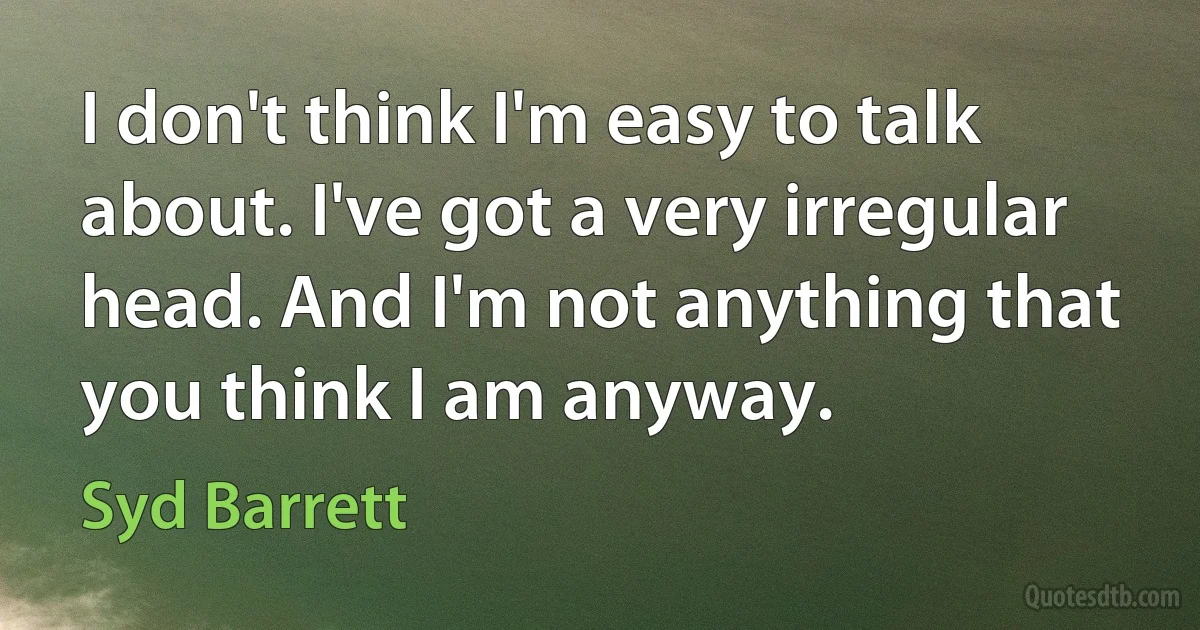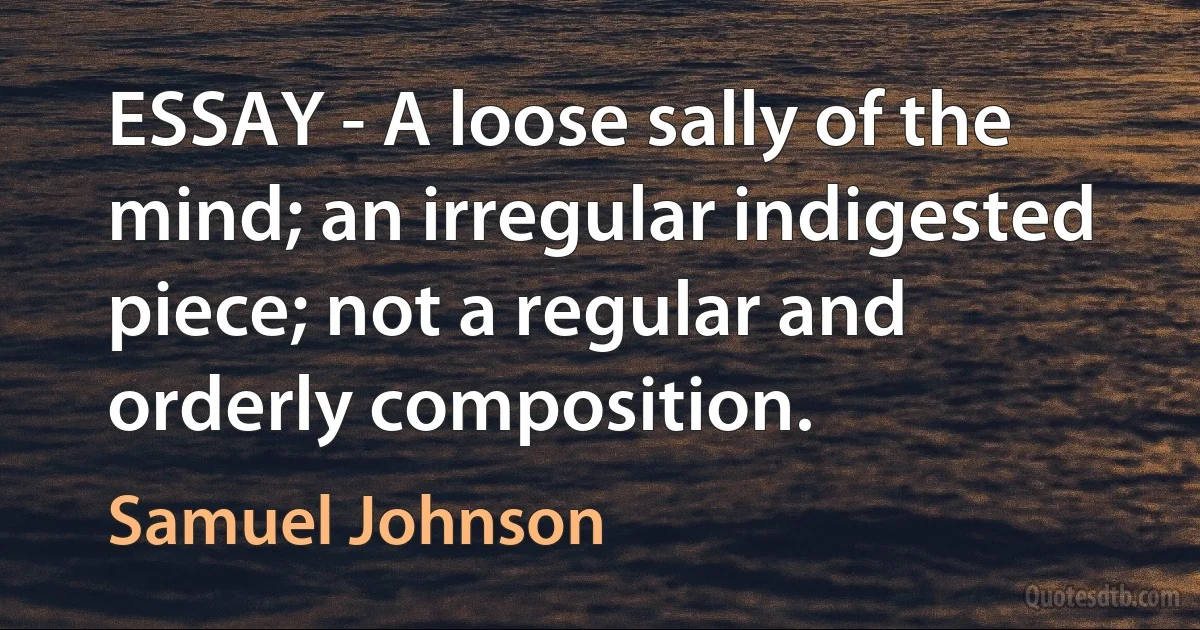Irregular Quotes
I conceived, developed and applied in many areas a new geometry of nature, which finds order in chaotic shapes and processes. It grew without a name until 1975, when I coined a new word to denote it, fractal geometry, from the Latin word for irregular and broken up, fractus. Today you might say that, until fractal geometry became organized, my life had followed a fractal orbit.

Benoît Mandelbrot
I claim that many patterns of Nature are so irregular and fragmented, that, compared with Euclid - a term used in this work to denote all of standard geometry - Nature exhibits not simply a higher degree but an altogether different level of complexity ... The existence of these patterns challenges us to study these forms that Euclid leaves aside as being "formless," to investigate the morphology of the "amorphous."

Benoît Mandelbrot
I hold that two principles are important; first that there should be a steady expansion of public services, not an irregular one related to revenue accruing in any particular year; the second that taxes should be constant over long periods (provided, that is, that they are neither burdensome nor inequitable).

John James Cowperthwaite
My colour has no symbolic function whatever. I don't want any colour to be noticeable. I want the colour to be the colour of life, so that you would notice it as being irregular if it changed. I don't want it to operate in the modernist sense as colour, something independent. I don't want people to say, "Oh, what was that red or that blue picture of yours, I've forgotten what it was."

Lucian Freud
In many different fields, empirical phenomena appear to obey a certain general law, which can be called the Law of Large Numbers. This law states that the ratios of numbers derived from the observation of a very large number of similar events remain practically constant, provided that these events are governed partly by constant factors and partly by variable factors whose variations are irregular and do not cause a systematic change in a definite direction.

Siméon Denis Poisson
Had there not been a natural goodness and indestructible force in my father, I see not how be could have bodied himself forth from these mean impediments. I suppose good precepts were not wanting. There was the Bible to read. Old John Orr, the schoolmaster, used from time to time to lodge with them; be was religious and enthusiastic (though in practice irregular with drink). In my grandfather, also, there seems to have been a certain geniality; for instance, he and a neighbor, Thomas Hogg, read "Anson's Voyages;" also tho "Arabian Nights," for which latter my father, armed with zealous conviction, scrupled not to censure them openly. By one means and another, at an early age he had acquired principles, lights that not only flickered, but shone steadily to guide his way.

Thomas Carlyle
There is an idea, which is not without its advocates, that a vigorous Executive is inconsistent with the genius of republican government. The enlightened well-wishers to this species of government must at least hope that the supposition is destitute of foundation; since they can never admit its truth, without at the same time admitting the condemnation of their own principles. Energy in the Executive is a leading character in the definition of good government. It is essential to the protection of the community against foreign attacks; it is not less essential to the steady administration of the laws; to the protection of property against those irregular and high-handed combinations which sometimes interrupt the ordinary course of justice; to the security of liberty against the enterprises and assaults of ambition, of faction, and of anarchy.

Alexander Hamilton
A person examining too nearly a small portion of a very large circle... would see in this detached portion merely a certain quantity of physical points, grouped in a more or less irregular manner, and so, indeed, as to seem as if they had been arranged by chance... But, placing himself at a greater distance, the eye embraces of necessity a greater number of points, and already a degree of regularity is observable... and by removing still farther from the object, the observer loses sight of the individual points, no longer observes any accidental or odd arrangements amongst them, but discovers at once the law presiding over their general arrangements, and the precise nature of the circle so traced.

Adolphe Quetelet
Now as to what pertains to these Surd numbers (which, as it were by way of reproach and calumny, having no merit of their own are also styled Irrational, Irregular, and Inexplicable) they are by many denied to be numbers properly speaking, and are wont to be banished from arithmetic to another Science, (which yet is no science) viz. algebra.

Isaac Barrow
Paddy and I had scarcely a wink of sleep, for there was a man near us who had some nervous trouble, shell-shock perhaps, which made him cry out 'Pip!' at irregular intervals. It was a loud, startling noise, something like the toot of a small motor-horn. You never knew when it was coming, and it was a sure preventer of sleep. ...he must have kept ten or twenty people awake every night. He was an example of the kind of thing that prevents one from ever getting enough sleep when men are herded as they are in these lodging houses.'

George Orwell
The lot of man is ceaseless labor,
Or ceaseless idleness, which is still harder,
Or irregular labour, which is not pleasant.
I have trodden the winepress alone, and I know
That it is hard to be really useful, resigning
The things that men count for happiness, seeking
The good deeds that lead to obscurity, accepting
With equal face those that bring ignominy,
The applause of all or the love of none.
All men are ready to invest their money
But most expect dividends.
I say to you: Make perfect your will.
I say: take no thought of the harvest,
But only of proper sowing.

T. S. Eliot
Unlike storybook heroes and heroines but like many actual heroes and heroines, she was something of a social outcast. (As Simone Weil noted, it was the people with irregular and embarrassing histories who were often the heroes of the Resistance in the Second World War; the proper middle-class people may have felt they had too much to lose.)

Pauline Kael
In France at least, the history of science and thought gives pride of place sciences, sciences of the necessary, all close to philosophy: one can observe in their history the almost uninterrupted emergence of truth and pure reason. The other disciplines, however - those, for example, that concern living beings, languages, or economic facts - are considered too tinged with empirical thought, too exposed to the vagaries of chance or imagery to age old traditions and external events, for it to be supposed that their history could be anything other irregular. At most, they are expected to provide evidence of a state of mind, an intellectual fashion, a mixture of archaism and bold conjecture, of intuition and blindness. But what if empirical knowledge, at a given time and in a given culture, did possess a well defined regularity.

Michel Foucault
As soon as the sound of the Peace-cry of my departing Wife had died away, I began to approach the Stranger with the intention of taking a nearer view and of bidding him be seated: but his appearance struck me dumb and motionless with astonishment. Without the slightest symptoms of angularity he nevertheless varied every instant with gradations of size and brightness scarcely possible for any Figure within the scope of my experience. The thought flashed across me that I might have before me a burglar or cut-throat, some monstrous Irregular Isosceles, who, by feigning the voice of a Circle, had obtained admission somehow into the house, and was now preparing to stab me with his acute angle.

Edwin Abbott Abbott



